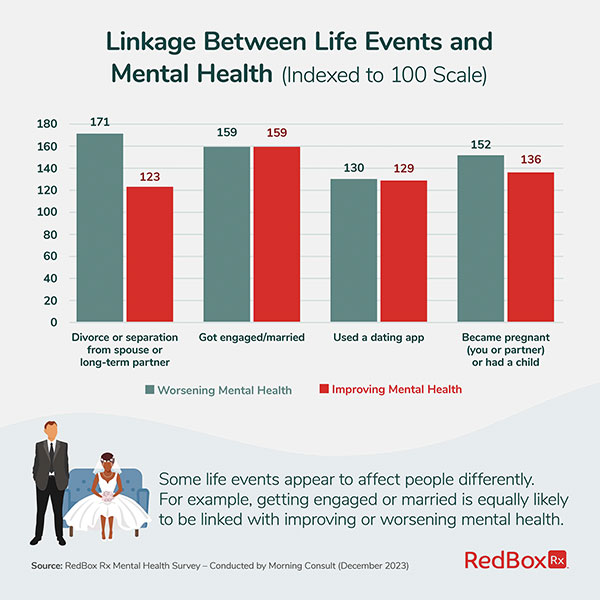(Family Features) People with outward appearances of success, productivity and happiness often still deal with internal struggles. Mental health challenges continue to affect Americans, with nearly 3 of 4 (73%) U.S. adults reporting struggles with mental health in 2023.
These findings come from a mental health survey commissioned by RedBox Rx, a telehealth and online pharmacy provider, and conducted by Morning Consult.
“Mental health remains a struggle for many Americans,” said Dr. Daniel Fick, RedBox Rx’s chief medical officer. “The findings from this study demonstrate more resources and support are needed to help individuals manage their mental health, especially younger adults. We are focused on fulfilling this need by offering easy-to-access, affordable, discreet and convenient telehealth care and treatment for those struggling with mental health.”
In honor of Mental Health Awareness Month, consider these mental health trends identified in the survey:
 1. Younger Generations are More Likely to Report Mental Health Struggles, Worsening Mental Health
1. Younger Generations are More Likely to Report Mental Health Struggles, Worsening Mental Health
Gen Zers and Millennials are more likely to report having mental health struggles and more likely to say those struggles worsened in the past year. In fact, 41% of Gen Zers and 36% of Millennials reported more mental health struggles in the past year compared with 21% of adults ages 45 and older.
2. Specific Life Events Affect People Differently
Some life events appear to affect people differently. For example, getting divorced or separated and becoming pregnant or having a child are linked with both worsening and improving mental health. Getting engaged or married and using a dating app are equally likely to be linked with both positive and negative impacts on mental health.
3. Younger Generations Endure Life Events Linked with Worsening Mental Health
Gen Zers and Millennials more frequently experience life events having the strongest links to worsening mental health. They more commonly report loneliness and a failure to achieve life goals, stressors also linked to worsening mental health. For example, 53% of Gen Zers reported feelings of loneliness and 52% shared feelings of failure to achieve life goals, compared with 39% and 34%, respectively, of all adults sampled.
The research also found recent life experiences, whether relational or personal, are linked to the state of one’s mental health. Those suffering from worsening mental health were more likely to have experienced:
- Being a victim of verbal or emotional abuse
- Being a victim of physical violence
- The lack of a healthy home environment
- The lack of a healthy work environment
- Attending college or university
- The breakdown in a relationship with a close family member
According to the study, if you’ve experienced verbal or emotional abuse – which is 12% more prevalent among Gen Zers – you are more than twice as likely to report worsening mental health.
4. Despite Mental Health Struggles, Most Americans Aren’t Seeking Professional Care
Even though mental health struggles are widespread among American adults, more than 6 out of 10 (63%) with consistent or worsening mental health struggles have not sought professional care, such as therapy or medications, in the past year.
Those not seeking care tend to downplay their situations or cite the cost of care as a barrier. Through its discreet, low-cost service model, RedBox Rx’s online platform makes it easy for patients to quickly schedule telehealth visits and privately meet with licensed medical providers to get help with treating a variety of mental health conditions including anxiety and depression, adult ADHD and insomnia.
“Telehealth offers an effective and convenient way for patients to easily access care for mental health conditions,” Fick said.
To view the full report, access infographics from the study and find more information about mental health therapy and medical treatments, visit RedBoxRx.com.
Photo courtesy of Shutterstock (woman using tablet)







